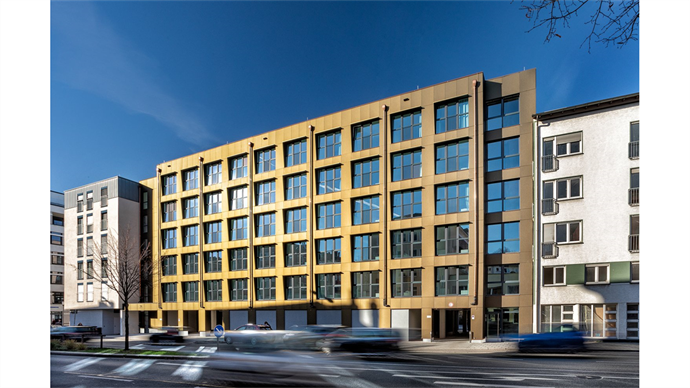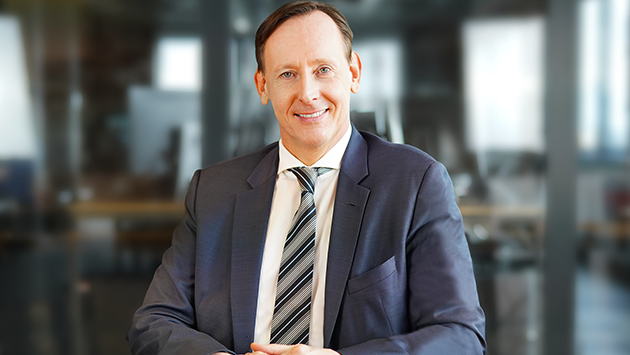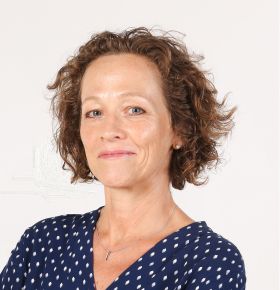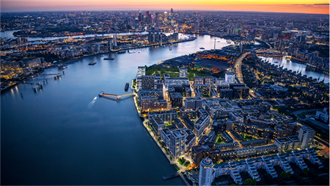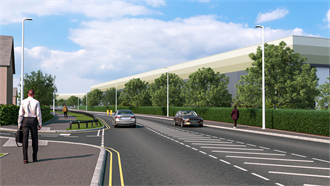Developer and asset manager Capital Bay says its drive to help alleviate the housing shortage in Germany by building modular homes is being thwarted by rigid permitting rules.
The Berlin-based company, which is pioneering modular construction techniques in Germany in partnership with Japanese global market leader Daiwa House, says the complex regulations are frustrating its efforts to scale up its activities, at a time when affordable housing is badly needed.
The permitting issues stem partly from the fact that modular construction is classified as ‘special construction’ in Germany and therefore subject to specific building regulations.
But a further complicating factor is that German building codes differ per federal state, making permitting procedures extremely arduous, says Capital Bay’s founder and CEO George Salden.
‘It’s strange, the government wants more industrialised production [of homes], but we have a fully anachronistic way of getting permits in place in Germany,’ Salden told PropertyEU.
He described how even the slightest change to a modular component can require a new permit to be requested, undermining efficiency and causing projects to be seriously delayed.
‘Every time you change the slightest thing, whether that be a screw or whatever, you basically have to re-permit the whole modular – it’s a whole new process. In other words, the government is asking for an industrialised process, but I have to create a unique situation for each market, so thus I can’t industrialise.’
With modular construction, standardised 2D and 3D components are manufactured in a factory-controlled environment and then transported to the building site for assembly. The technique is said to cut construction time by 50% and costs are also significantly lower.
Sustainability benefits are another advantage: up to 85% of the building materials can be recycled, leading to lower carbon emissions and less waste.
Capital Bay is seeking to ramp up production at its new ‘gigafactory’ for modular units in Fürstenwalde in the northeast of the country, which came on stream earlier this year. Under its JV with Daiwa House, which operates in Europe as Daiwa House Modular Europe, the firm plans to manufacture modules for all types of residential asset, from student housing and micro-living to serviced apartments, senior living and care facilities.
The Fürstenwalde facility has already delivered 3,000 modular homes as part of a contract with the government of Berlin, and deals have been signed for projects in Magdeburg and Dusseldorf. In Fürstenwalde itself, located some 60 km east of Berlin, around 1,000 housing units are being built for the factory workers.
Salden stressed that the biggest obstacle to growth was the lack of a harmonised regulatory framework in Germany enabling nation-wide production. ‘If I build in Fürstenwalde, I can apply for an offer from the relevant authority, but if I then go to the next state, I’m subject to a whole new set of laws - there are 3,500 different building codes in Germany.’
The Capital Bay boss remarked that the firm’s Japanese partners were ‘somewhat in shock’ at the cumbersome regulatory system in Germany. In the Netherlands, where Daiwa House is also active, building codes are far less complex and there is less red tape, he said.
For the situation to change in Germany, the entire ‘infrastructure’ behind the regulatory framework – including lawyers, building and technical specialists – has to support a unified system and work together towards implementing it, Salden argued. ‘We’re helping in every possible way we can, but it takes two to tango,’ he said.
German housing shortage
On the topic of the housing shortage in Germany, Salden said the package of measures recently presented by the government to boost residential investment was ‘a move in the right direction, but needs to be widened’.
‘We see a silver lining on the horizon now that the government understands that if action is not taken there will be social uproar,’ said Salden, commenting on the 14-point plan which aims to support investment to build affordable and climate-friendly living spaces, as well as help the real estate and construction industry navigate macroeconomic challenges. The plans will be funded out of the government’s €212 bn Climate and Transformation Fund.
The German government has consistently failed to meet its target of building 400,000 new homes in recent years, due to a combination of rising financing costs and price hikes for building materials. The country’s housing shortage is at its highest level in 20 years, according to the German property federation ZIA.
Said Salden: ‘We have a diametrically moving market in Germany – on the one hand there’s drastic demand for housing but at the same time supply is falling, so the gap is widening rather than closing.’
He added: ‘We’re talking about a fundamental human right – living is as elementary as eating and drinking, so it’s not optional, it’s a must-have product.’
Salden said the switch to climate-friendly housing stock would take time, and was a matter of a full generation, rather than a few years. ‘The idea that this will be done in a very short amount of time I think is a complete fantasy. It will be the work of a generation to switch all German assets into fossil free. The very principle of how houses are built, how cities are built, that paradigm has to shift.’
‘Disruption’ from macroeconomic factors such as rising interest rates, as well as structural trends such as digitalisation and urbanisation were all impacting the pace of change, he noted.

